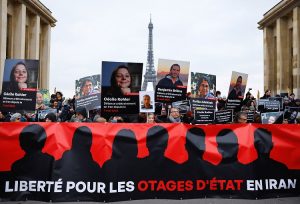The Islamic Republic of Iran’s treatment of political prisoners and detained foreign nationals is under intense scrutiny after France filed a lawsuit against Iran at the International Court of Justice (ICJ) for its prolonged detention of a French couple — Cecile Kohler and Jacques Paris. The pair, arrested in 2022, appeared to confess on Iranian state television soon afterwards that they were spies for the French government, a claim that France has denied.
Meanwhile, the European Parliament has passed a resolution calling on Iran to stop its maltreatment of political prisoners and detained dual nationals, and urged the Council of Europe – a pan-European body that promotes human rights, democracy and the rule of law — to include the Islamic Revolutionary Guards Corps (IRGC) on its list of terrorist organizations.
A separate legal complaint has been filed by lawyers at Berlin’s European Center for Constitutional and Human Rights on behalf of the late Jamshid Sharmahd — an Iranian-born, German-American dual national who died in custody after being kidnapped, tortured, and kept in solitary confinement for almost 1,000 days by the Iranian authorities. Sharmahd was sentenced to death in 2023 on charges including “corruption on Earth.” After his body was sent to Berlin by the Iranian authorities in February, an autopsy revealed that several organs and body parts were missing.
Human Rights Concerns in Iran Are ‘Extensive and Complex,’ Says UN Report
“The organs that have been removed – the heart, tongue, larynx, and thyroid – were all those that would be able to show my father was strangled to death,” said Shahrmad’s daughter, Gazelle Shahrmad, in an interview with Kayhan Life. “Further investigations are needed to find the exact cause of death, which is difficult when you don’t have the whole body.”
The district attorney’s office in Cottbus, Germany, which carried out the autopsy, has called on Germany’s Federal Prosecutor to launch an investigation into Sharmahd’s death, a request which was also made by Amnesty International.
“Mutilating his corps, removing organs before sending him back to the family who cannot even recognize their dad is just something that I will never find the words to describe — it’s barbaric, it’s monstrous,” Gazelle Shahrmad said. “My father’s horror provides the legal basis whereby under universal jurisdiction Germany has a legal duty to investigate and so does the US.”
“My father was kidnapped during a flight overlay in Dubai, through Oman, to Iran,” Gazelle said. “Whatever talks between Iran and the US are going on right now must be halted until US President Donald Trump and the US Justice Department, as well as senior German lawmaker Friedrich Merz and the German federal court have started investigations and arrest warrants are issued to everyone involved.”
The lawsuit filed on Shahrmad’s behalf was submitted by German attorneys Wolfgang Kaleck, the founder of ECCHR, and Patrick Kroker, a senior ECCHR legal advisor. The lawsuit also cites Gazelle as a witness in the case.
The ECCHR launched the first successful legal action against Bashar Al-Assad’s regime in Syria — leading to the unprecedented conviction in 2022 of senior Assad government officials for crimes against humanity in Syria.

“The message is clear: they cut out his tongue because what they feared most about my father was him speaking the truth, his larynx which carried his voice, and his heart that was beating for the people in Iran and was courageous beyond words,” Gazelle said. “This barbaric desecration of my father’s corpse will be the very reason that my father’s voice, his message and his courage will spread louder around the world.”
Meanwhile, at least 50 political prisoners are now at risk of execution in Iran, including three women, according to an April 11 statement by the Center for Human Rights in Iran (CHRI).
Concerns about the increased use of violence against political dissidents were raised in the April 1 European Parliament resolution, which was submitted by 20 lawmakers and adopted two days later.
The resolution cited the sharp rise in executions in the Islamic Republic, and the death sentences for political prisoners Behrouz Ehsani and Mehdi Hassani, which were upheld by Iran’s Supreme Court on Feb. 23 following an appeal. The resolution added that the men had been subjected to torture, ill treatment, and prolonged solitary confinement, and had been denied their basic rights while in detention in Iran.
The European Parliament “strongly condemns the use of the death sentence in Iran, which is also used systematically as a tool to suffocate any form of dissent; reiterates its strong opposition to the death penalty; urges the Iranian government to introduce an immediate moratorium leading to its abolition,” the resolution said. It also criticized the oppression of women, minority groups, and the use of hostage diplomacy which included the arbitrary detention of dual and foreign nationals in Iran.
A separate clause in the resolution repeated previous requests by the European Parliament for the Council of Europe to proscribe the IRGC. The military wing is one of the most powerful forces in Iran, with extensive influence over domestic policy.
“Parliament reiterated its call to designate the Islamic Revolutionary Guard Corps a terrorist organization and continue identifying and sanctioning Iranian authorities responsible for human rights violations,” the summary of the resolution said.













